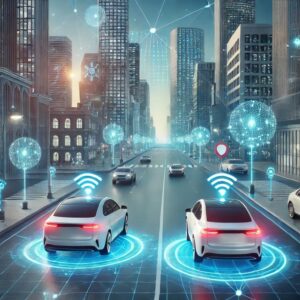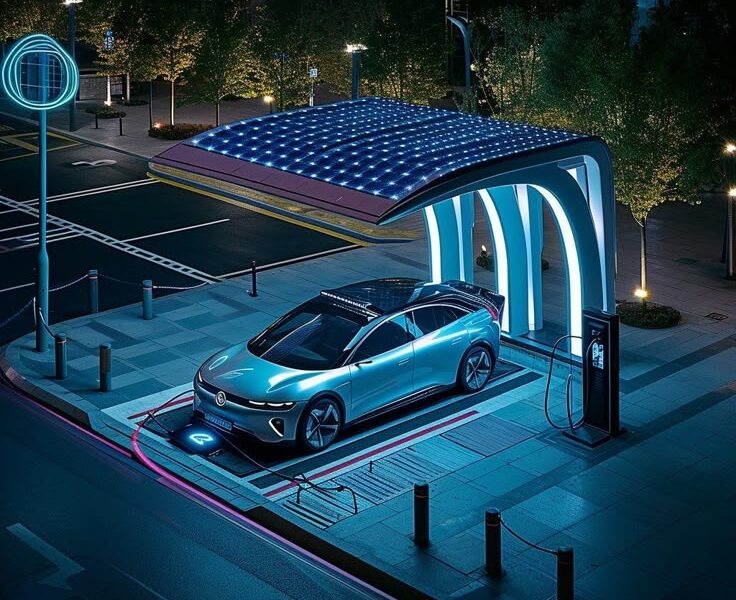🌍 Revolutionizing the Global Auto Industry: The Dawn of a New Era
Electric vehicles have shaken the foundations of the global automotive industry, fundamentally transforming business models that have been established for over a century. Traditional car manufacturers, who relied on internal combustion engines for decades, are now compelled to transition to electric mobility. Major companies like Volkswagen, Toyota, General Motors, and Ford are focusing on the production and development of electric vehicles with billions of dollars in investment. This shift has also radically altered supply chains, with battery manufacturers like CATL, LG Chem, and Panasonic emerging as new industrial leaders. Competition among nations has given rise to new economic powers, with China becoming a global leader in electric vehicle production and exports. The European Union has introduced stringent regulations under the Green Deal to achieve its carbon-neutral economy goal. The U.S. Inflation Reduction Act has announced incentives to promote domestic manufacturing. Countries like India and Southeast Asian nations are promoting local electric vehicle production. This industrial transformation has created new job opportunities while making the adaptation of old skills essential. Automotive engineering courses are incorporating electric vehicle technology as a mandatory component. Research and development budgets have seen extraordinary increases. The establishment of industrial clusters and gigafactories is becoming the center of new economic activities. All these changes together are ushering the automotive industry into a new era.

🌱 Achieving Sustainability Goals: New Pathways for Environmental Protection
Electric vehicles have played a significant role in achieving global sustainability goals, proving to be a powerful weapon in the fight against climate change. Under international agreements like the Paris Agreement, electric vehicles are recognized as a key means of decarbonizing the transportation sector. In the struggle against urban air pollution, electric vehicles have improved public health by eliminating emissions of nitrogen oxides and particulate matter. Integration with renewable energy has enhanced the environmental benefits of electric vehicles, where charging facilities powered by solar and wind energy have made fully zero-emission transportation systems possible. Battery recycling and reuse under circular economy principles have aided in resource conservation. The use of sustainable materials has reduced the environmental footprint of manufacturing. Reduced noise pollution has made urban environments more peaceful. Water conservation has been aided as electric vehicles do not require water for cooling. Land use efficiency has improved since oil extraction and refining facilities are no longer needed for electric vehicles. Biodiversity conservation has been supported. All these environmental benefits are making electric vehicles a crucial pillar of sustainable development.
🚗 Transforming Daily Commuting Experiences: A New Form of Personal Transport
Electric vehicles have radically changed daily commuting experiences, making transportation more peaceful, economical, and enjoyable for consumers. Charging convenience has eliminated the need to visit fuel stations, allowing consumers to charge their vehicles at home or office. Lower maintenance costs have reduced the financial burden on owners, as electric vehicles do not require oil changes, spark plugs, or exhaust system repairs. Smooth and quiet operation has made the driving experience more serene. Instant torque and rapid acceleration have made driving more enjoyable. Advanced technologies like regenerative braking have transformed driving methods. Smart features and over-the-air updates have improved vehicles over time. Remote control via mobile apps has provided new conveniences for consumers. Reduced operating costs have decreased daily travel expenses. Improved safety features have enhanced the protection of drivers and passengers. Enhanced connectivity has boosted productivity during travel. All these benefits together are making the commuting experience better than ever before.
💰 Economic Changes: Opportunities for New Economic Development
Electric vehicles have created profound changes in the global economy, providing opportunities for new economic development. Battery manufacturing has given birth to a new industry, with companies like CATL, LG Chem, and Panasonic competing globally. The construction of charging infrastructure has created new job opportunities in the construction and engineering sectors. Renewable energy integration has boosted the solar and wind energy sectors. The battery recycling industry has generated new business opportunities. Software development has created applications and platforms for electric vehicles. Investment in research and development has increased. New educational programs have been launched to train a skilled workforce. International trade has seen a rise in exports of electric vehicles and their components. Investment opportunities have attracted venture capital and private equity. All these economic changes are driving new economic activities.
🏭 Transforming Industrial Processes: New Manufacturing Methods
Electric vehicles have brought fundamental changes to industrial manufacturing processes, which are radically different from traditional methods. Simplified design has made manufacturing less complex, as electric vehicles have fewer moving parts. Automated production lines have increased manufacturing efficiency. Robotics and artificial intelligence have improved manufacturing quality. Supply chain optimization has made component delivery more efficient. New quality control standards have enhanced product reliability. Sustainable manufacturing practices have reduced environmental impacts. Digital twin technology has enabled virtual testing and simulation. Additive manufacturing has facilitated rapid prototyping. Modular design has increased manufacturing flexibility. All these industrial changes are making the manufacturing process more effective.
🔌 Infrastructure Development: Expansion of Charging Networks
The proliferation of electric vehicles has accelerated the development of charging infrastructure, paving the way for the construction of an extensive network. Public charging stations have made charging facilities common in urban areas. Highway charging corridors have enabled long-distance travel. Home charging solutions have provided convenience for consumers at home. Workplace charging has offered charging facilities for employees at work. Fast charging technology has reduced charging time. Wireless charging has increased convenience. Smart charging networks have improved energy management. Renewable energy integration has promoted sustainable charging. Battery swapping stations have provided alternative solutions. All these infrastructure developments are making the use of electric vehicles even easier.
📊 Data and Technology: An Intelligent Transportation System
Electric vehicles have promoted intelligent transportation systems through the use of data and technology, making transportation more efficient. Vehicle connectivity has enabled real-time data collection. Artificial intelligence has facilitated predictive analytics. The Internet of Things has created connectivity between devices. Cloud computing has provided data storage and processing facilities. Blockchain technology has ensured secure transactions. 5G networks have enabled high-speed communication. Big data analytics have identified patterns. Machine learning has improved decision-making. Cybersecurity measures have ensured system protection. All these technological advancements are making transportation systems more intelligent.
🌐 Global Cooperation: International Partnerships
Electric vehicles have created new opportunities for global cooperation, fostering international partnerships. International standards have created harmony. Joint ventures have established partnerships between local and international companies. Technology transfer has enabled knowledge sharing. Research collaborations have created opportunities for joint research. Trade agreements have facilitated international trade. Diplomatic efforts have improved policy coordination. Global forums have enabled the exchange of best practices. Multilateral initiatives have organized joint efforts. All these global cooperation measures are accelerating the global transition to electric mobility.
🚀 Future Possibilities: The Path of Continuous Development
The future of electric vehicles is extremely bright, with continuous development possibilities. Advanced battery technologies have improved performance. Autonomous driving has transformed the concept of transportation. Vehicle-to-grid integration has created new opportunities for energy management. Sustainable materials have reduced environmental impacts. Smart city integration has created harmony with urban systems. Innovative business models have generated new economic opportunities. Global expansion has increased access to international markets. Research breakthroughs have introduced new technologies. All these future possibilities will keep the electric vehicle sector on a path of continuous advancement.
🤝 Social Impacts: Positive Changes in Society
Electric vehicles have created profound positive changes in society through social impacts. Improved public health has enhanced the well-being of citizens. Energy access has enabled energy availability in remote areas. Economic inclusion has created opportunities for economically disadvantaged groups. Educational opportunities have made training in new skills possible. Social equity has promoted social justice. Cultural change has increased environmental awareness. Community development has aided the progress of local communities. Quality of life has improved. All these social impacts reflect the positive changes electric vehicles are bringing to society.


